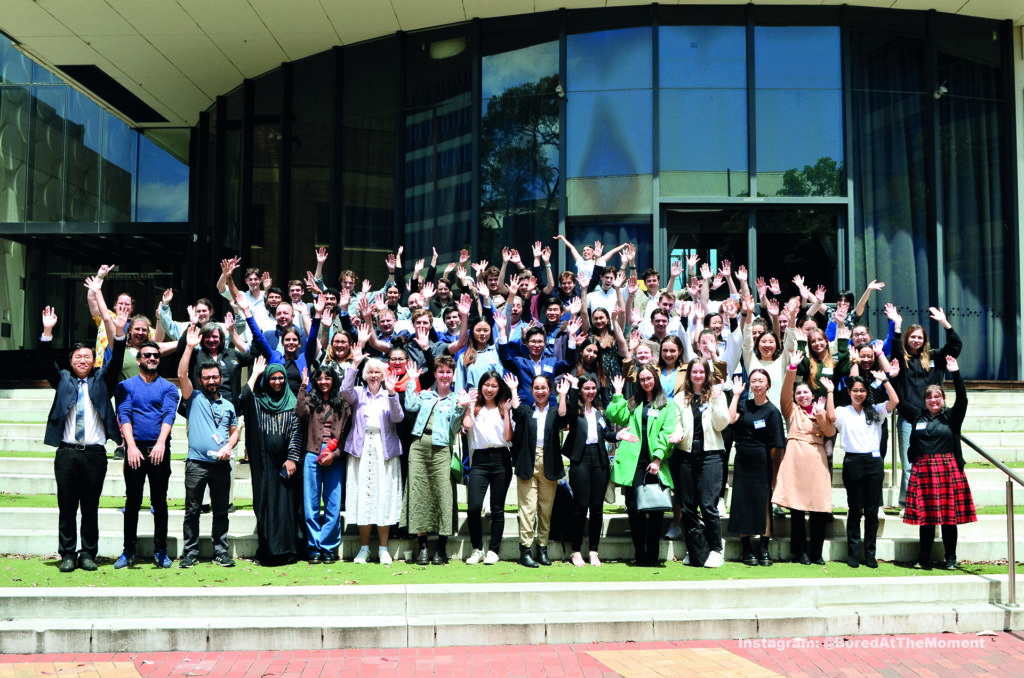

View more photos here
Overview
The theme for ACUR2023 conference is “A Connected World: New Research Directions”. As technology continues to advance, and our world becomes increasingly connected, there will undeniably be new directions that research could take. These could be, for example, exploring the implications of a connected world and how this connectivity could be leveraged to create a better world. The possibilities are vast and will require solid ethical frameworks to guide decisions and actions. For ACUR2023, we are asking students to demonstrate how their research reflects/contributes/highlights/develops these possibilities. What new directions are being identified? How will artificial intelligence impact? How can society benefit from revolutionising industries, from manufacturing to healthcare or fields from marketing to criminal justice.? What about environmental sustainability and the health of our planet? How can social media activities inform on people’s behaviour?
Program
Please see the ACUR 2023 Program
Prizes
1st Prize Oral $800 (sponsored by SoSCET)
Charles McKinley
Macquarie University
The Influence of Psychedelic Attitudes on Psychedelic Experiences: A Prospective Study
2nd Prize Oral $500 (sponsored by Swinburne Research)
Georgie Aiuto
Swinburne University of Technology
How are STEM outreach programs promoting STEM careers to Victorian school students?”
3rd Prize Oral $300 (sponsored by SoBLE)
Sahba Monzaviyan
Western Sydney University
Examining the Inter Rater-Reliability of Proxy-Raters Measuring the Subjective Well-Being of People Living with Dementia
Best Poster Presentation $500 (sponsored by La Trobe University)
Alexandra Mruk
Macquarie University
Parents Lay Beliefs About the Causes of Hunger, Satiety, and Thirst in Children: An Exploratory Investigation
People’s Choice Content $300 (sponsored by SoDA)
Natasha Grant, Jack Gore, Galen MacFarlane, and Jacob Davis
Swinburne University of Technology
Crustaceans Against Algae: Developing New Materials for Nutrient Adsorption
People’s Choice Visuals $300 (sponsored by SoHS)
Yee Hang (Josie) Yip
The University of Queensland
Microplastic in Moreton Bay
Best Paper Education $500 + One-year HERDSA Membership (offered by HERDSA)
Brayden Condie
Western Sydney University
Can Infants Learn from Extended Reality?
2nd Best paper Education $300 (sponsored by School of Social Sciences, Media, Film and Education)
Anita Walker
University of Sunshine Coast
The Pedagogical Beliefs of Queensland & Irish Mathematics Teachers
Most Inspirational Talk: $300 (sponsored by SoE)
Rohan Ford
Swinburne University of Technology
Exploring Frontiers: My Journey in Undergraduate Research – Engineering SMACCSAT1 and leading a student team to orbit
Quotes from students taken from their LinkedIn
“I am delighted to have been accepted as one of the poster presenters in this conference that empowers undergraduate students in their initial endeavours into the research industry.”
“The conference provided an incredible platform for students nationwide to come together, make new connections, and explore diverse disciplines. Being part of this vibrant academic community was an enriching experience, and I am deeply grateful for the opportunity. “
“Fast forward to last month, and I found myself presenting my research at the Australasian Council for Undergraduate Research 2023 conference, a three-day event that opened my eyes to the wonders of research in STEM and non-STEM fields.”
“Good times in Melbourne at the Australasian Council for Undergraduate Research conference! Thanks to Carmine Buss, behind the Undergraduate Research Fellowship University of the Sunshine Coast six fellows could present our research in a wide variety of field, from education and psychology to environmental management/science and biomedics! What if we next year would bring all of this research home?”
“Last week, I had the honour to present my summer research project ‘Microplastic in Moreton Bay’ at the 2023 Australasian Council for Undergraduate Research Conference at Swinburne University of Technology.”
“Thank you ACUR for this opportunity, and I am excited to be awarded runner up for poster presentation and people’s choice award for best poster visual.”
“Glad to see amazing research across disciplines from students across Australia. It was great to see the supports from ACUR and universities to enrich undergraduate student research experience.”